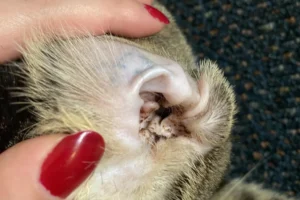Are you wondering why your cat has parasites? Let’s break it down.
Wondering why your cat has parasites? The answer might surprise you.
Understanding Parasites in Cats
Parasites are unwelcome guests that can harm your furry friend. The most common types of parasites that affect cats are fleas, ticks, worms, and mites. Fleas are small, brown insects that feed on your cat’s blood, causing itching and discomfort. Ticks are arachnids that attach to your cat’s skin, potentially transmitting diseases. Worms such as roundworms, tapeworms, and hookworms, can cause weight loss, diarrhea, and other health issues. Mites are tiny insects that can lead to ear infections and skin problems.
It’s essential to regularly check your cat for signs of parasites and consult your veterinarian for preventive measures and treatment if needed.
Common Symptoms of Parasites in Cats
Detecting parasites early is crucial to prevent further health complications for your beloved pet. Look out for excessive scratching or grooming, hair loss, visible worms in feces, dark specks on fur (flea dirt), skin irritation or redness, and unexpected weight loss. If you notice any of these symptoms, it’s essential to seek advice from your veterinarian promptly.
Additionally, maintaining good hygiene practices and using preventive medications recommended by your vet can help keep your cat parasite-free and healthy. Remember, a healthy cat is a happy cat!
How Cats Contract Parasites
Cats can contract parasites through various means, such as ingesting contaminated food or water, coming into contact with infected animals, or even through the environment. Parasites like fleas, ticks, and worms can easily latch onto your furry friend, causing them discomfort and potential health issues. It’s essential to keep your cat protected to prevent these pesky parasites from wreaking havoc on their well-being.
Preventing Parasites in Cats
One effective way to prevent parasites in cats is by regularly using parasite preventatives recommended by your veterinarian. These can include topical treatments, oral medications, or collars specifically designed to repel parasites. Additionally, maintaining a clean living environment for your cat, including regular grooming and cleaning of their bedding and living areas, can help reduce the risk of parasite infestations.
Here are some additional tips to help prevent parasites in your feline friend:
- Keep your cat’s living area clean and free of debris, as parasites thrive in dirty environments.
- Regularly groom your cat to check for any signs of parasites and maintain their overall health.
- Consult your veterinarian regularly to ensure your cat is up to date on parasite preventatives and screenings.
Remember, prevention is key when it comes to protecting your beloved pet from parasites. By taking proactive measures and staying informed, you can keep your cat happy, healthy, and parasite-free.
Treatment Options for Parasites in Cats
When it comes to treating parasites in your furry feline friend, it’s crucial to consult your veterinarian for the best course of action. Depending on the type of parasite your cat has, there are various treatment options available.
1. Medication: Your vet may prescribe oral or topical medication to eliminate the parasites. It’s important to follow the dosage instructions carefully and complete the full course of treatment.
2. Flea Collars: Flea collars can be effective in controlling and preventing flea infestations. Make sure to choose a collar that is safe for cats and replace it as recommended by your vet.
3. Topical Treatments: Products like spot-on treatments can help eliminate parasites like fleas and ticks. These are applied directly to your cat’s skin and provide long-lasting protection.
4. Environmental Control: To prevent re-infestation, it’s essential to treat your cat’s living environment. Regularly clean bedding, carpets, and furniture to remove any parasite eggs or larvae.
5. Regular Check-ups: Schedule routine vet visits to monitor your cat’s health and address any parasite issues promptly. Your vet may recommend preventive measures to protect your cat from future infestations.
Remember, each cat is unique, so it’s essential to follow your vet’s recommendations for the most effective treatment plan tailored to your furry companion’s needs.
Checking for Parasites in Cats
Curious about how to check your cat for parasites? It’s essential to be proactive in monitoring your cat’s health to catch any potential issues early. Here’s a simple guide to help you properly check your cat for parasites:
1. Visual Inspection: Inspect your cat’s fur for signs of fleas, ticks, or other external parasites. Look for redness, bumps, or excessive scratching, which could indicate a problem.
2. Check the Ears: Examine your cat’s ears for dark discharge, redness, or irritation, which may indicate ear mites. Your vet can provide guidance on how to safely clean your cat’s ears.
3. Monitor Bowel Movements: Regularly check your cat’s litter box for signs of worms, such as rice-like segments. If you notice anything unusual, contact your vet for further evaluation.
4. Routine Vet Visits: Regular check-ups with your vet are essential for parasite prevention. Your vet can perform screenings and recommend preventive measures to keep your cat healthy.
By staying vigilant and proactive in checking for parasites, you can help ensure your cat’s well-being and prevent any potential health issues. Don’t hesitate to reach out to your vet if you have any concerns about your cat’s health.
Parasites and Your Cat’s Health
Parasites can significantly impact your cat’s health, causing a range of issues from mild discomfort to severe illness. Common parasites such as fleas, ticks, and worms can weaken your cat’s immune system, leading to symptoms like weight loss, lethargy, vomiting, and diarrhea. In severe cases, untreated parasites can even be life-threatening to your feline friend. Regular check-ups with your veterinarian can help detect and treat parasites early, ensuring your cat stays healthy and happy.
Fun Fact About Parasites
Did you know that some parasites have evolved unique ways to manipulate their host’s behavior for their benefit? For example, the Toxoplasma gondii parasite can infect rodents, altering their brain chemistry to make them attracted to cats, their natural predator. This increases the chances of the parasite completing its life cycle back in the cat’s intestines. Isn’t nature fascinating and sometimes a bit strange?
Helpful Resource: For more information on parasites and your cat’s health, visit this helpful guide from the American Veterinary Medical Association.
Expert Advice on Parasite Prevention
Let’s talk parasites and our feline friends. Nobody wants their fur baby dealing with these pesky critters. So, what can you do to prevent them from wreaking havoc on your cat’s health?
Regular Vet Visits : Don’t skip those check-ups. Your vet can recommend the best parasite prevention plan tailored to your cat’s specific needs.
Flea and Tick Control : Invest in quality flea and tick prevention products recommended by your vet. These parasites can transmit diseases and make your cat miserable.
Indoor Living : Keeping your cat indoors can help reduce the risk of parasites like ticks and fleas. It’s a win-win for your cat’s health and safety.
Clean Environment : Regularly clean your cat’s living space to minimize the risk of parasites breeding and spreading.
Proper Nutrition : A balanced diet can help boost your cat’s immune system, making them less susceptible to parasites.
Remember, prevention is key when it comes to parasites. Stay vigilant and keep your furry friend happy and healthy.
For more in-depth information on parasite prevention, check out this resource from the American Veterinary Medical Association: Parasite Prevention for Cats.
Alex, a passionate animal lover, has experience in training and understanding animal behavior. As a proud pet parent to two dogs and three cats, he founded AnimalReport.net to share insights from animal experts and expand his knowledge of the animal kingdom.









